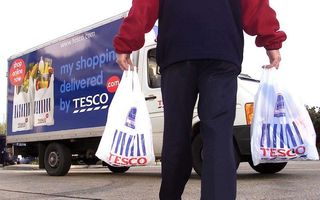Tesco checks out first in online grocery shopping
Tesco's online service does its sums far quicker than rivals, which can take up to half a minute to tot up the items added to a shopping basket, claims research group

When it comes to online grocery shopping, the likes of Tesco, Ocado and Sainsbury's jostle for trolley space in the virtual aisles.
A new study, however, suggests Tesco is leading the pack.
It performs "head and shoulders above its competitors," according to Keynote Systems.
The company measured the major websites in terms of site availability and performance - specifically, the time it took to load items into the virtual shopping basket.
While some sites processed items quickly - for example, Ocado lead the way with a 5.23 second load time - other sites laboured - for example, Asda, recorded a staggeringly slow 31.17 to load.
Conversely, the slower sites had better stats for availability.
Beyond giving a boost to Tesco morale, however, the report highlighted the obstacles faced by online consumers, particularly in the run up to Christmas.
Get the ITPro. daily newsletter
Receive our latest news, industry updates, featured resources and more. Sign up today to receive our FREE report on AI cyber crime & security - newly updated for 2024.
In order to buy one item from one of the retailers, a user needs to go through several pages to put an item into the basket and proceed to the checkout.
Over the three days of measurement, Tesco led the way with an average load time of 5.694 seconds and site availability of 99.47 per cent.
Next best in the combined rankings was Ocado (5.232 seconds, 93.804 per cent), then Sainsbury's 20.362 seconds, 98.952 per cent) and Asda (31.17 seconds, 99.27 per cent).
"Load testing and preparation for December's peak traffic is usually done during the summer but it seems that some retail sites underestimated the increasing reliance on web commerce and are now falling behind," said Haran Sold, vice president and managing director of Europe, the Middle East and Africa (EMEA) for Keynote Systems.
"As a result, some customers are being let down by the companies they are traditionally loyal to, often forcing them to consider a competitor."
Back in September, another report by accessibility specialist Nomensa, also highlighted how UK retailers are shutting out disabled shoppers with poor site design.
All of the UK's top 30 retail websites failed to meet the most basic of accessibility requirements, according to the report.
It estimated that retailers would lose 376 million of potential revenue this Christmas as a result of websites that are difficult to use.
"There are over 10 million disabled people in the UK, and I believe that each one of those has a right to be able to buy a Christmas present online for a friend or loved one this year," said Simon Norris, Nomensa's managing director.
"These research findings show that anyone with serious physical impairments, the visually impaired or even just people wearing glasses to read would encounter difficulties and in many cases would give up trying."
One factor that may help the online supermarkets is an agreement over clear pricing.
In March of this year, the Office of Fair Trading (OFT) said it had brokered a commitment to provide clearer details on the cost of produce.
They reportedly agreed to provide more upfront information about their guide price policies and how their online shopping process worked.
The main issue the OFT was tackling was that the prices charged on delivery were different from those advertised on the vendor's website.
Specifically, the supermarkets committed to the principle that the prices shown online are the actual prices for that day (in the store from which the goods will be assembled for delivery).




